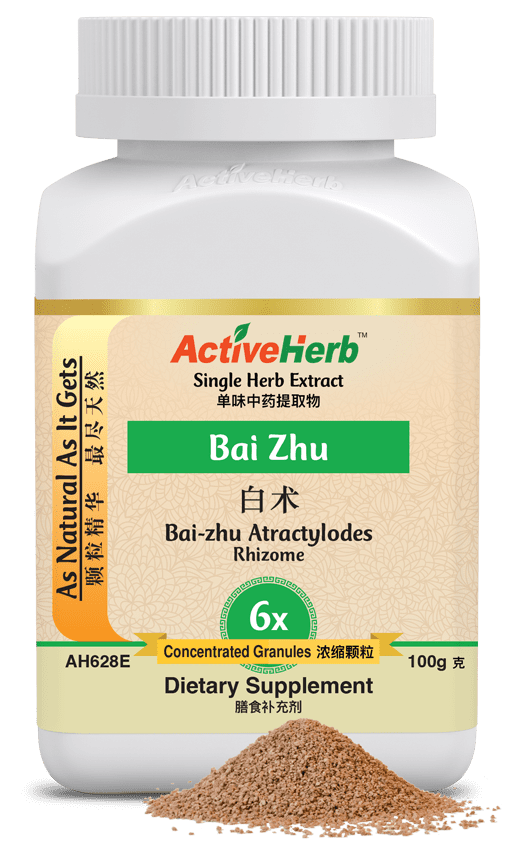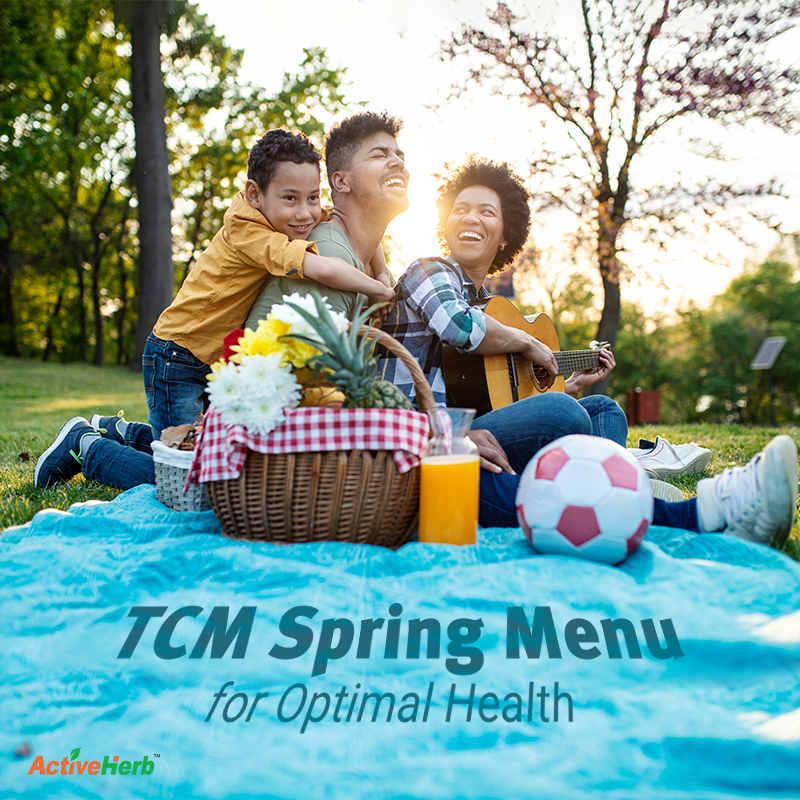Atractylodes: The Attractive TCM Herb That May Help You Go #2

If you’re constipated, chances are you’ll try just about anything to find relief. But if your constipation is because of Spleen Qi Deficiency, laxatives might not solve the real problem. Instead, the solution might lie in restoring your Spleen Qi with a time-tested herbal ally: Bai Zhu (Atractylodes Rhizome).
And now, thanks to a new animal study, there’s scientific evidence supporting what TCM doctors have known for centuries: Atractylodes may help you go #2.
Bai Zhu: The Gut’s Best Supporting Actor in TCM
Bai Zhu is one of the premier Spleen Qi tonics in the Chinese herbal pharmacopeia.
Traditionally, it’s used to:
- Strengthen the Spleen and dry Dampness
- Promote water metabolism and stop spontaneous sweating
- Calms the fetus during pregnancy
In TCM, the Spleen isn’t the same as the anatomical spleen in Western medicine. It refers to a system responsible for digesting food, extracting Qi (vital energy), and distributing nutrients throughout the body. When your Spleen Qi is deficient, your body may struggle to transform food into energy and fluids—leading to fatigue, bloating, and yes, constipation.
According to the Doctrine of Signatures—the ancient idea that the appearance of an herb hints at its therapeutic use—Bai Zhu’s thick, knobby root resembles the gut’s complex folds and pathways. TCM practitioners have long interpreted this as a sign of Bai Zhu’s ability to support digestive health.
You’ll find Bai Zhu in many classic formulas, including:
- Xiang Sha Liu Jun Zi Pian (Stomakinder™)
- A modern twist on two classic digestion formulas (Six- and Four-Gentlemen Decoction), formulated to harmonize your gut.
- Main Focus: Digestive discomfort from Qi stagnation and Damp-Cold in the Middle Jiao.
- Ideal for: bloating, fullness, gas, belching, nausea, and sluggish digestion after meals.
- Addresses Spleen Qi deficiency + stagnation or Damp-Cold interfering with digestion.
- Warmer and more Qi-regulating than DigestVive (see below) due to added aromatic herbs (like Mu Xiang and Sha Ren)
- Purchase this if you feel like your food is stuck, and if you feel very heavy, and bloated.
- Shen Ling Bai Zhu Pian (DigestVive™)
- Main focus: Frequent loose stools, fatigue, and Damp accumulation from long-term Spleen Qi deficiency.
- Best for fatigue, loose stools, water retention, weak muscles, and soft, sagging tissue.
- Stronger than Stomakinder at draining Dampness and firming up the gut.
- Ideal for: Spleen Qi deficiency + Dampness leading to fluid retention and weakness.
- Try it if: you feel puffy, tired, and your digestion is leaky or sluggish.
- Ping Wei Pian (Ping Wei San, Stomach Dampclear™)
- Relief From “Vacation Belly”
- Main focus: Targets post-indulgence digestive distress fast.
- Dries out Dampness and harmonizes the Stomach. Based on a 1,000-year-old time-tested formula, this blend clears Damp from rich or cold foods that bog down digestion.
- Take at the first sign of bloating or stomach upset. And if your tongue has a thick white coating, that’s your body waving the Damp flag.
Bai Zhu Cheat Sheet
In summary, here’s how these three formulas work:
- Stomakinder = gas, bloating, food stagnation
- DigestVive = chronic loose stools, fatigue, Damp
- Stomach Dampclear = acute digestive upset, bloating, heaviness from Damp-inducing foods (greasy and heavy)
How Atractylodes May Work For Constipation
A recent study published in the Journal of Ethnopharmacology suggests how Bai Zhu may work for sluggish bowels—particularly when Spleen Qi is compromised.
Researchers induced Spleen Qi Deficiency and constipation in rats by combining senna extract (a known purgative), a low-fiber diet, and stress-inducing fatigue exercises. The rats exhibited hallmark signs of Spleen Deficiency: low fecal output, dry stools, poor digestion, and general weakness.
After treatment with a high dose of Bai Zhu (4.32 g/kg crude herb), the rats showed major improvement in:
- Stool frequency and hydration
- Intestinal transit time
- Colon morphology
- Neurotransmitters related to gut motility
But here’s where it gets interesting…
The researchers also measured changes in the rats’ gut microbiome and bile acid metabolism. (Bile helps break down digestive fats.) Spleen-deficient rats had imbalanced gut flora and abnormal bile acid levels—both of which were significantly corrected by Bai Zhu.
Bai Zhu also regulated the expression of TGR5, a key receptor involved in bile acid signaling, which plays a role in bowel movement and intestinal motility.
Why Does Spleen Qi Deficiency Cause Constipation?
According to TCM, when Spleen Qi is weak, it fails to “transport and transform” food and fluids efficiently. This can lead to internal Dampness, Qi stagnation, and poor peristalsis. In short: your gut doesn’t move as it should.
Weak Spleen Qi can also disrupt the Lung and Large Intestine relationship. The Lung governs Qi descent; when that function is impaired, the bowel doesn’t receive the proper energetic signal to eliminate waste.
Not All Constipation is the Same, in TCM
Perhaps no other health concern spotlights the difference between TCM and Western medicine than constipation. While Bai Zhu may be effective for constipation caused by Spleen Qi Deficiency, it’s not a one-size-fits-all solution.
Other TCM constipation patterns include:
- Excess Heat in the intestines (To resolve this pattern, see Huang Lian Shang Qing Pian, aka CoptisClear.)
- Qi Stagnation (stress-related tension)
- Blood Deficiency (especially in postpartum or elderly individuals)
- Yang Deficiency (cold-type constipation)
To learn more about these patterns and which formulas may help, check out: “Is Your System Backed Up? Let TCM Ease Bowel Movement”
What If You’re Not a Rat?
While the study results are promising, keep in mind that they were based on a rodent model. More research is needed before drawing definitive conclusions about Bai Zhu’s effects in humans. That said, the historical use and safety record of Atractylodes speak volumes.
What TCM Formula Does ActiveHerb Recommend for Constipation?
For constipation relief, ActiveHerb.com offers a best-selling signature formula:
Tong Chang Pian (Constipass™)
This isn’t your average herbal laxative. Constipass™ helps moisten the intestines and promote regularity without harsh stimulation. While Bai Zhu isn’t in the formula, we like to think outside the box—who knows, maybe one day we’ll include it in a future blend.
Conclusion: A Root That Pulls Its Weight
Atractylodes macrocephala, a.k.a. Bai Zhu, is far more than just another root in the TCM toolbox. It may help restore healthy bowel movements—not by forcing things along like a laxative, but by addressing the underlying issue of Spleen Qi Deficiency.
So if you’re feeling blocked, bloated, or just off your rhythm, this ancient herb might be just the thing to help you go #2… naturally.







